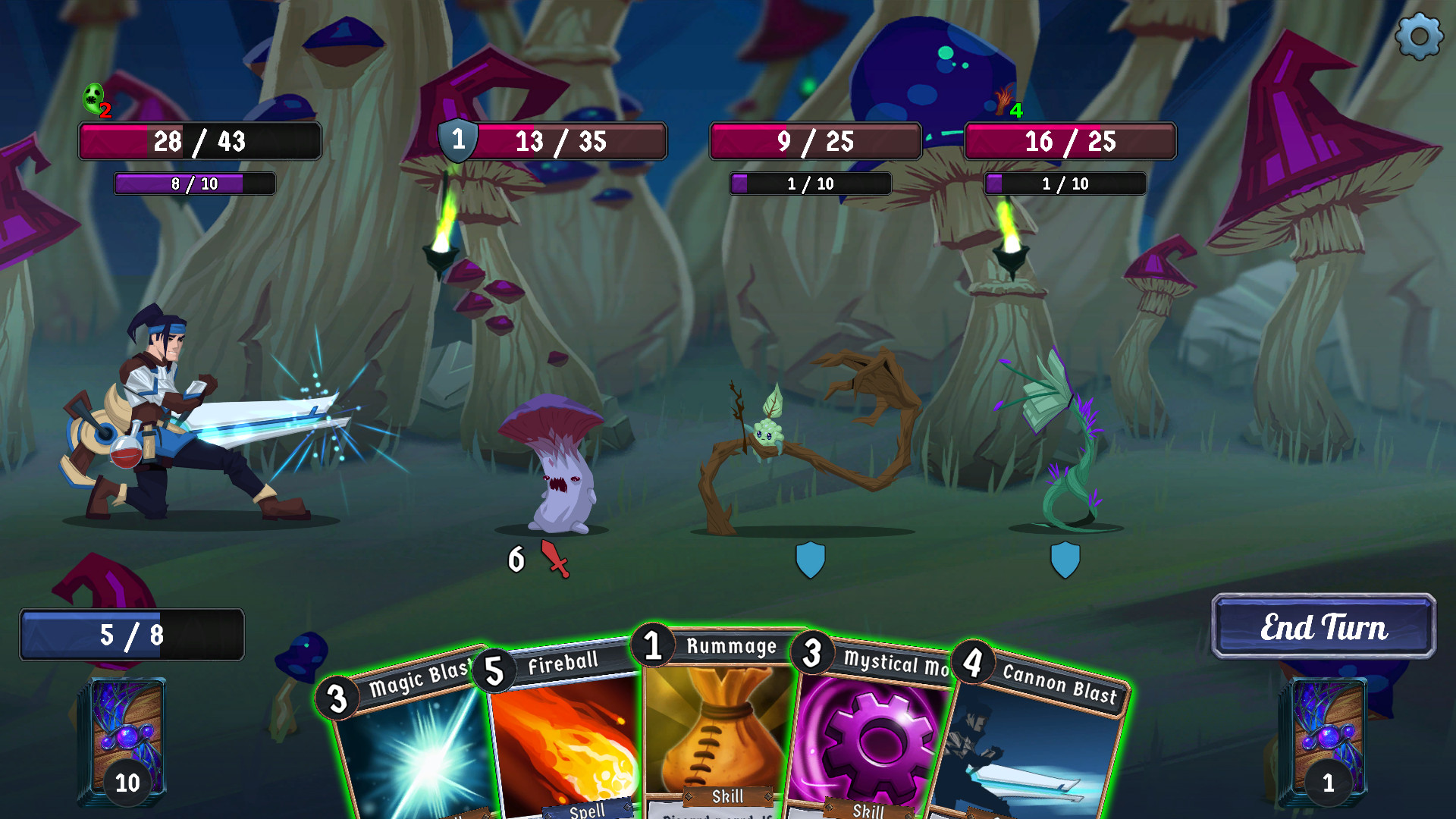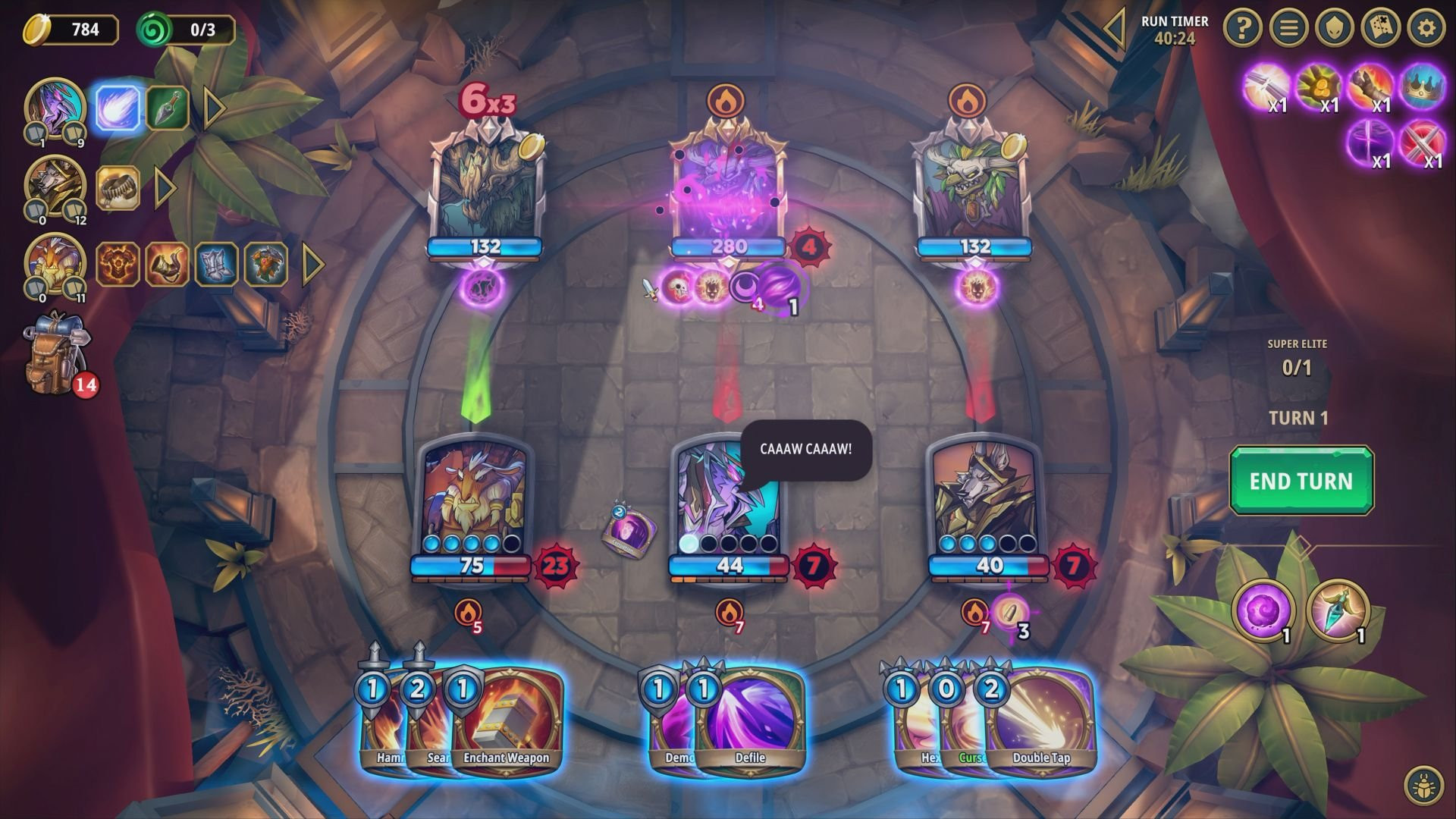Some games feel as familiar and comforting as sinking into a favourite armchair with a cup of tea and a copious supply of Bilbo Baggins' finest pipeweed. Elemental Exiles, an RPG-adjacent roguelike deck builder with a high fantasy theme, is that kind of experience.
If you've played any indie card battlers in recent years—and especially if you've played the king of them all, Slay the Spire—you'll soon settle into an enjoyable rhythm with this one. But familiarity can breed contempt, and after a few hours of merry card-comboing, I started feeling frustrated with the lack of meaningful progression and the weak writing that made the RPG elements feel as thin as butter scraped over too much bread (that's my last hobbity reference, I promise).
First, let's talk about the familiar bits. You'll pick a character with a basic deck of cards and fight a succession of monster mobs in turn-based battles. There's a mix of attack, block, and skill cards, and a finite pool of energy with which to play them each turn. Enemies telegraph their next move in advance, allowing you to plan your turns strategically. Winning a battle gains you gold, potions, and an opportunity to add a new card to your deck. There are boss battles, inns where you can spend gold, and narrative encounters that often involve a risk/reward trade-off.
This is the same formula that has been used in many deck builders for the past five years, and it works just as well here as anywhere. So, what's new? Well, as the game's title suggests, many cards fall into one of three elemental types - fire, water, and nature - which have a straightforward rock-paper-scissors relationship. A fire card will do double damage against a nature block, but only half damage against a water block. Some cards have extra effects that activate when specific conditions are met. For instance, 'Vapor Strike' is a water card that deals bonus damage if played directly after a fire card.
Every card in the game has a durability rating, meaning it has a limited number of uses before it breaks. This is meant to force you to evolve your deck throughout a run rather than relying on a small number of powerful cards to brute force your way through. But I didn't find this to be as impactful as it sounds. The durability of cards varies, but it is usually fairly high, meaning it's only in the later stages of a run that you start seeing cards fall out of your deck from overuse.
I'm not sure I'm convinced by the thinking behind this feature either. An exciting moment in any deck builder is when you find a potent combo of cards that at first seems ludicrously overpowered. While it's certainly true that, after the initial adrenaline rush wears off, an overpowered card or combo can ruin a game by tipping the scales too far in the player's favour, I think there are better ways to balance this out. For instance, in Slay the Spire, one of my first nearly-successful runs involved a deck based on playing a ton of low cost 'Shiv' attack cards, but this strategy unravelled when I was confronted by the time eater boss, who is calibrated to punish exactly this kind of strategy. Other bosses and elite enemies are cleverly calibrated to counter other powerful player strategies. Compared to that, this durability system feels like an overly blunt, sledgehammer-to-crack-a-nut kind of solution.
The other thing that should make Elemental Exiles stand out is that it is meant to be an RPG, but in this respect it falls completely flat. There are twelve playable characters to choose from (although only three are unlocked from the start), drawn from the usual menagerie of fantasy races. There's an elf adept at nature magic, a sassy lady bounty hunter who don't need no man tellin' her what to do, a scowling dwarf researcher, and so on. Most are broad fantasy archetypes, although as a fan of Terry Pratchett's Mort I was pleased to see Bob, an overworked, entry-level grim reaper, in the roster.
Each character has their own quest to complete, composed of four story beats spread out across the map. The overworld map itself is probably the feature that makes this feel most like an RPG, and is perhaps the biggest departure from other deck builders. Rather than being funnelled down a narrow path with only a few forks in the road, you are free to venture off in any direction from your starting point and double back on yourself if you choose. You're constrained by the need to clear encounters to progress, but this more open structure gives proceedings a fun fantasy questing vibe. It also makes the game more forgiving. For example, once you discover the location of an inn, you can choose to beat a path back there at any time to heal or purchase upgrades. Bosses are helpfully given star ratings, so if you feel too weak to take on a three-star boss, you can always retreat and return later when you're ready.
My only complaint about the map is that it lacks specificity. I couldn't tell you the name of the world this game takes place in, nor any details that make it unique, because, as far as I can tell, there aren't any. This problem extends to the writing, which is probably the weakest part of the game. The best thing I can say is that it's not riddled with spelling mistakes or awkward mistranslations. But it's as bland as a beige pudding, rarely amounting to more than a few lines that inform you that some spiders, orcs, or prissy elves have appeared to ambush you. The encounters linked to quest progression aren't any more inspiring. The quest lines I completed for this review basically boiled down to: go here to meet or kill this chap, then go somewhere else to meet or kill another dude, because you are a dwarf that needs information, or a bounty hunter that wants revenge, or whatever.
I feel I should make it clear that I don't normally expect a deck builder to have a good story, or sharp writing, or to be an RPG. But since Elemental Exiles says it's an RPG and presents itself as such, the dullness of the quests and the writing stands out more than it might otherwise.
Normally, I'd advise simply ignoring this aspect of the game and focusing on the card play, but there's a problem with that too. I was genuinely surprised when I realised I wasn't unlocking new cards or blessings as I played, even after successfully completing an entire quest line. Most roguelikes shower you with new unlocks, even after failed runs, to give you a sense of progression and to keep things interesting by providing new options for play. But that's not the case here. The only new options that came my way were new playable characters, which are unlocked after you find and defeat them in the overworld.
This might be OK if each character brought with them a unique deck and new mechanics, but instead they all play by the same rules and draw from the same pool of cards, which means the longer you play with each character the more they feel the same as any of the others. Each character does begin with a unique blessing, although oddly the reward for completing their quest line is that you gain the ability to disable that blessing for future runs... to make the game harder, I guess?
Despite these limitations, I've still enjoyed my time with Elemental Exiles, which makes its lack of satisfying progression and tissue-thin RPG wrapping all the more frustrating. The card play here is good if you like this type of game (which I do). The elemental system is easy to understand but adds some enjoyable complexity to battles. The same goes for the conditional cards. Most bosses and elite enemies can be interrupted at key moments, meaning you can prevent them from landing a big attack if you strike them a certain number of times. I liked this as it gives you another option for controlling fights, and a feeling of being a nimble David outfoxing a lumbering Goliath.
The artwork on the cards is also rather fetching, with bright, highly-saturated colours that give the game a cosy, fairy tale feel. While the monsters and playable characters are mostly familiar fantasy archetypes, they look the part with detailed, pleasing designs in keeping with the artwork on the cards. I was also impressed by how clearly the game conveyed information, both on the cards and in tooltips. This really matters in a card game with a lot of numbers and effects flying around that all need to be taken into consideration.
In the end, I can't wholeheartedly recommend Elemental Exiles. While the card battles are fun and engaging, what's wrapped around that core—the RPG stuff and the progression—dissolves upon contact. And with the popularity of this sub genre, there are just too many alternatives with great card mechanics and a whole lot more besides. Want a deck builder that also feels like a legit RPG? Try Tainted Grail. Want a creepy cryptic narrative to go with your card play? Inscryption has you covered. Want furry animals in space? There's Cobalt Core. And so on. In this crowded market, Elemental Exiles doesn't do enough to stand out, but if you've already played the usual suspects and are desperate for something new, you'll find some enjoyment here.


















